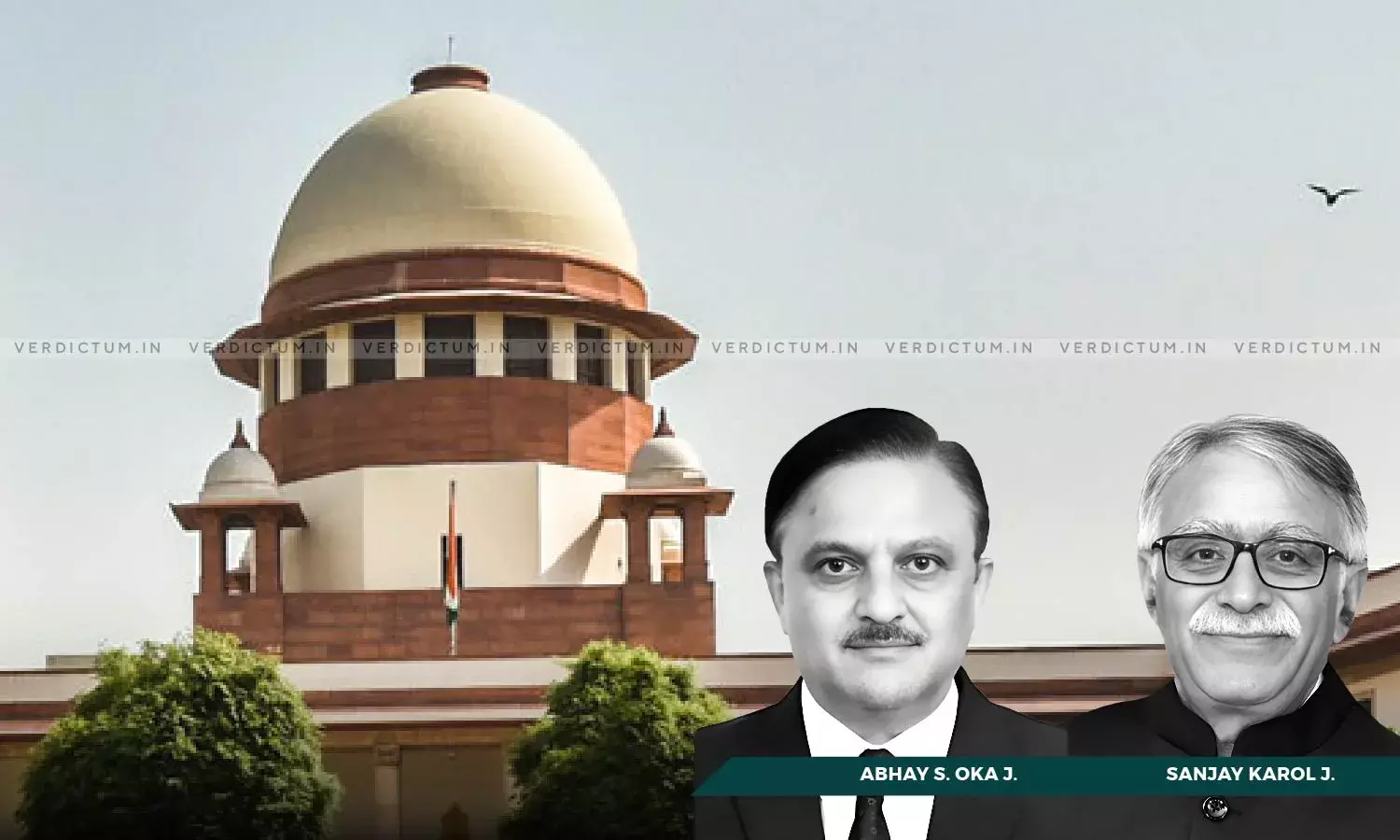A Court Cannot Modify Arbitral Award U/S.34 Of Arbitration & Conciliation Act: Supreme Court

The Supreme Court observed that a court under Section 34 of the Arbitration and Conciliation Act has no jurisdiction to modify an arbitral award.
The Court was deciding an appeal against the judgment passed by the Karnataka High Court under Section 37(1) of the Arbitration and Conciliation Act, 1996 (A&C Act) was challenged.
The two-Judge Bench of Justice Abhay S. Oka and Justice Sanjay Karol, referring to the judgment in National Highways Authority of India v. M. Hakeem (2021) 9 SCC 1, observed: "Any court under Section 34 would have no jurisdiction to modify the arbitral award, which at best, given the same to be in conflict with the grounds specified under Section 34"
The Bench said that the view taken by the Arbitrator is a plausible view and could not have been substituted for its own by the Court.
Advocate Anil Kaushik represented the appellant while AAG Avishkar Singhvi represented the respondent.
In this case, the issue arose was as to whether the High Court was justified in confirming the order under Section 34 of the A&C Act, passed by the Senior Civil Judge whereby the award passed by the Arbitrator was modified and the amount awarded was reduced. The appellant person had secured a contract from the Karnataka State Public Works Department to construct the office and residence of the Chief Conservator of Forests at Sirsi for an amount of Rs. 14.86 lakhs. The said contract was entered into between the parties in 1990 with the stipulation that the possession of the construction site would be handed over to the claimant/appellant.
The work allotted was to be completed on or before May 6. 1992 i.e., 18 months from the date of the agreement excluding the monsoon season. However, the work allotted could not be completed by the claimant, for which, he held the authorities of the State responsible as they allegedly did not clear his bills, repeatedly at every stage and also due to delays caused by change of site and in delivery of material for such construction. Hence, the parties resorted to the arbitral mechanism and an Arbitrator was appointed. The claimant filed his claim before the Arbitrator totalling to Rs. 18,06,439/-. The Arbitrator found the respondents liable but then the Civil Judge modified the arbitral award by which the claimant was dissatisfied.
The Supreme Court after hearing the contentions of the counsel noted, “A perusal of the judgment and order of the learned Civil Judge, in the considered view of this Court, does not reflect fidelity to the text of the statute. Nowhere does it stand explained, as to, under which ground(s) mentioned under Section 34 of the A&C Act, did the Court find sufficient reason to intervene. In fact, quite opposite thereto, the Court undertook a re-appreciation of the matter, and upon its own view of the evidence, modified the order.”
The Court further said that the circumscribed nature of the exercise of power under Sections 34 and 37 i.e., interference with an arbitral award, is clearly demonstrated by legislative intent and the Arbitration Act of 1940 had a provision (Section 15) which allowed for a court to interfere in awards, however, under the current legislation, that provision has been omitted.
“The learned Single Judge, similar to the learned Civil Judge under Section 34, appears to have not concerned themselves with the contours of Section 37 of the A&C Act. The impugned judgment reads like a judgment rendered by an appellate court, for whom re-examination of merits is open to be taken as the course of action. … We find the Court to have held the award to be perverse and contrary to public policy. The basis for such a finding being the delay on the part of the contractor in completion of the work which “could have been avoided”. Significantly, as we have observed earlier such a finding is not backed by any material on record”, also noted the Court.
The Court added that the factoring of the cost escalation between the years 1989-90 and 1992 by 100% was exaggerated, but then equally, there is no justification in granting lump sum escalation by 25% of the contract value. It said that this cannot be a reason to modify the award for the parties are governed by the terms and conditions and the price escalation stood justified based on cogent and reliable material as was so counted by the Arbitrator in partly accepting and/or rejecting the claims.
“On the issue of interest, we notice that the Arbitrator has awarded interest @ 18% p.a., w.e.f. 09 March 1994 which stood reduced to 9%. The transaction being commercial in nature, we see no reason as to why the claimant could not be entitled to interest in terms of the rate quantified by the Arbitrator which includes the period of pre-arbitration, pendante lite and future”, observed the Court.
It, therefore, concluded that the claimant is entitled to interest and that the Arbitrator awarded 18% interest which stood reduced by the courts below to 9% without any legal basis.
Accordingly, the Apex Court allowed the appeal, set aside the judgment of the Civil Judge, restored the award passed by the Arbitrator, and directed the State to pay the amount expeditiously.
Cause Title- S.V. Samudram v. State of Karnataka & Anr. (Neutral Citation: 2024 INSC 17)
Appearance:
Appellant: Advocates Abhishek Mishra, Shashi Sharma, and AOR Arunima Dwivedi.
Respondents: AOR V. N. Raghupathy, Advocates Manendra Pal Gupta, and Vivek Kumar Singh.


